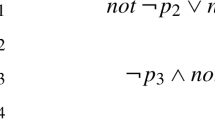Abstract
Some notions of the logic of questions (presupposition of a question, validation, entailment) are used for defining certain kinds of completeness of elementary theories. Presuppositional completeness, closely related to ω-completeness ([3], [6]), is shown to be fulfilled by strong elementary theories like Peano arithmetic.
Similar content being viewed by others
References
N. D. Belnap and T. B. Steel, The Logic of Questions and Answers, Yale University Press, New Haven and London, 1976.
W. Buszkowski, Erotetic Completeness, in: Logic, Methodology and Philosophy of Science VIII, Abstracts, vol. 5, part 3, pp. 239–241, “Nauka”, Moscow, 1987.
A. Grzegorczyk, A. Mostowski and C. Ryll-Nardzewski, The classical and the ω-complete arithmetic, Journal of Symbolic Logic 23 (1958), pp. 188–206.
D. Harrah, The Logic of Questions, in: D. Gabbay and F. Guenthner (eds.), Handbook of Philosophical Logic, vol. II, pp. 715–764, D. Reidel, Dordrecht, 1984.
D. Scott, Completeness and Axiomatizability in Many-Valued Logic, in: L. Henkin et al. (eds.), Proceedings of the Tarski Symposium, pp. 411–436, AMS, Providence, 1974.
C. Smorynski, The Incompleteness Theorems, in: J. Barwise (ed.), Handbook of Mathematical Logic, pp. 821–865, North-Holland, Amsterdam, 1977.
R. Wójcicki, Theory of Logical Calculi: an Introduction, D. Reidel, Dordrecht, forthcoming.
Author information
Authors and Affiliations
Rights and permissions
About this article
Cite this article
Buszkowski, W. Presuppositional completeness. Stud Logica 48, 23–34 (1989). https://doi.org/10.1007/BF00370631
Received:
Issue Date:
DOI: https://doi.org/10.1007/BF00370631




